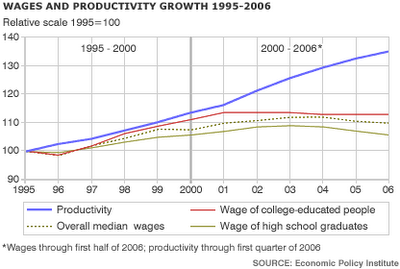Juraj says ----> My previous suspicions about the motivations of some
conservative media notwithstanding, the Financial Times shows that fair
and balanced reporting can be achieved by having educated people on the
ground, and not watching crap like fox news. <----
Sick men of new Europe: why reform fatigue has hit the east
By Robert Anderson, Jan Cienski, Christopher Condon and Stefan Wagstyl
Published: September 27 2006 03:00 | Last updated: September 27 2006
03:00
Once, the sight of tens of thousands of east Europeans demonstrating
against their governments would spark waves of hope and joy in the west.
Not any more. Riots in Hungary - the first since the overthrow of
communism - are prompting doubt and concern about the region's future.
Demonstrators stormed the state television station in scenes reminiscent
of the developing world, not of the well-heeled centre of Budapest.
While only in Hungary have people lately resorted to violence, there are
also signs of instability elsewhere among the states that joined the
European Union in 2004.
In Poland, voters could soon go to the polls for the second time in a
year following the collapse of an unruly coalition. The Czech Republic
has had no effective government since a June general election produced a
hung parliament. In Slovakia, Robert Fico, the populist prime minister,
holds power with the backing of Vladimir Meciar, an authoritarian
predecessor, and Jan Slota, leader of the radical Slovak Nationalist
party. Ferenc Gyurcsany, the Hungarian prime minister, says: "There is
real rivalry in these countries between nationalist radicals and
progressives."
The dangers should not be exaggerated. Central Europe is not in crisis.
Economic growth is 2-3 percentage points faster than in western Europe.
Hostility to reforms may be no worse than in Germany, France or Italy.
More than 15 years of economic progress, EU and Nato membership and
foreign investment act as stabilising forces.
But prolonged instability would cause real harm. Mainstream parties are
courting popularity by postponing painful reforms needed to complete
post-Communist modernisation. While living standards are nearly 40 per
cent higher than in 1989, they remain 45 per cent below west European
levels. Dissatisfaction is opening doors to populists with sometimes
limited allegiance to EU principles such as fiscal rectitude,
market-based economic policies and respect for minority rights.
Trouble in central Europe could also undermine efforts to revive support
for the EU's further enlargement. While the European Commission
yesterday gave conditional approval for Romania and Bulgaria to join
next year, there is considerable uncertainty about future applicants,
notably Turkey.
The origins of the turmoil lie in reform fatigue. Some 17 years after
communism fell, central Europeans have had enough of restructuring. The
benefits of change have been unevenly spread, leaving the low-paid, the
unemployed and pensioners feeling abandoned and abused by corruption.
These sentiments were kept in check before EU accession, as few
politicians wanted to risk losing membership through political or fiscal
indiscipline. But since joining the EU in May 2004, central European
politicians no longer feel the need to be on best behaviour.
In addition, with the need to maintain consensus gone, politicians are
free to resume old quarrels, including disputes between ex-Communists
and former anti-Communists that have resurfaced in Hungary and Poland
and ethnic rows in Slovakia. Alek-sander Smolar of the Stefan Batory
Foundation, a Warsaw think-tank, says: "I think we are seeing a delayed
reaction to the whole very costly and very painful process of European
integration."
These effects differ between countries. In Hungary, where the communist
regime was relatively liberal, the post-communist transition has been
fairly smooth. Both the ex-communist Socialists and the conservative
Fidesz have shamelessly courted voters through fiscal hand-outs, which
have stretched public resources to the limit.
Mr Gyurcsany, the Socialist prime minister who won re-election this
spring, has pledged to break with the past and introduce fiscal
discipline. But he queered his pitch with an admission to party
colleagues that he won the election by lying to the public about the
government's finances (see below).
Despite the street protests, Mr Gyurcsany has held his ground, saying
his words were a call to action. While the demonstrations have eased
since the weekend, the prime minister faces a key test in local
elections on Sunday.
Like Hungary, the Czech Republic has recently followed a fairly smooth
economic course, allowing governments of both the leftist Social
Democrats and the conservative ODS to dodge painful restructuring,
notably in healthcare and pensions. With economic growth strong,
business people are unconcerned that the country was without a
government for three months and that Miroslav Topolanek, the newly
appointed ODS prime minister, is unlikely to last more than a few
months. There seems little to drive Czechs to political radicalism, but
the lack of a stable government may yet prove unsettling.
By contrast, Slovaks have lived through turbulent times. After escaping
from Mr Meciar's grip in 1998, the country embarked on liberal reforms
and leapt from laggard to leader in post-Communist transition and
attracted big foreign investors, headed by motor manufacturers. But with
unemployment stubbornly high, voters lost patience and this summer
elected Mr Fico on an anti-reform ticket. Despite warnings from EU
partners, Mr Fico's Smer party allied itself with Mr Meciar and Mr
Slota's nationalists.
Pavol Demes, head of central and eastern Europe at the German Marshall
Fund, a US public policy institution, says the worst fears about the
Fico government have not been realised. However, Slovakia's Hungarian
minority is worried about Mr Slota, business people are concerned about
how electoral promises will be reconciled with commitments to fiscal
discipline and the Europe-wide Party of European Socialists is preparing
to suspend Smer over its ties with the nationalists.
In Poland, a difficult post-Communist transition, involving a sweeping
economic overhaul, has left voters particularly disenchanted with
political elites. As a result, the conservative PiS last year won
parliamentary elections by promising to clean up politics. Voters
expected PiS to form a coalition with the liberal Civic Platform. But
the putative partners fell out, leaving PiS to cobble together a
government with support from the leftist populists of Self-Defence and
the rightwing League of Polish Families.
But PiS and Self-Defence split this month, leaving PiS to seek new
allies in the Peasants party. If it fails, another election is in
prospect. However, this instability has not stopped President Lech
Kaczynski and his twin brother, Jaroslaw Kaczynski, the prime minister,
from pursuing a radical agenda - purging ex-Communists from public life
and centralising control of institutions such as the central bank. They
have also taken an assertive approach to foreign relations -
particularly with regard to Germany and Russia, Poland's big neighbours,
where they have stirred up past enmities.
Business people are concerned about the divisive effects of the
anti-Communist purge. However, they are less worried about macroeconomic
policy: growth is strong and the budget is under control, with the
planned 2006 and 2007 deficits below 3 per cent of gross domestic
product - the ceiling for joining Europe's monetary union.
Across the region, however, aspirations to membership of the eurozone
have been a victim of post-accession politics. Before 2004, governments
were pledging early entry - notably in Hungary, which wished to join by
this year. But Hungary's 2006 budget deficit target is a towering 10 per
cent of GDP.
Slovakia remains committed to a firm date - 2009 - but there are doubts
whether Mr Fico will stick to a time-table set by his predecessor. Some
new EU members are well ahead, with Slovenia joining next year and the
Baltic states due in 2008. But for the rest in central Europe, the aim
is for 2010-14.
Postponing their single-currency ambitions allows governments to delay
reforms required to bring deficits down to the euro-entry 3 per cent.
Economists warn that central Europe is missing an opportunity to
undertake reforms that will be needed later, perhaps in more difficult
conditions.
Meanwhile, developments in the region are affecting relations with EU
partners. Poland, in particular, is finding it hard to square its
new-found assertiveness with the need for EU-wide co-operation, even in
energy, where Warsaw wants close ties.
There is little danger that big west European states will turn on
central Europe. But if central European countries develop unpredictable
reputations they will find it harder to influence their partners. This
is particularly important for further enlargement, favoured by most
central Europeans.
Central Europe is not doomed to political irrelevance. Given its strong
economic record and importance to world business, it will not be
ignored. However, the region needs consistent and predictable leadership
if it is to make its voice heard at the EU table.
Additional reporting by Robert Anderson, Jan Cienski and Christopher
Condon
Copyright The Financial Times Limited 2006
click to see more





